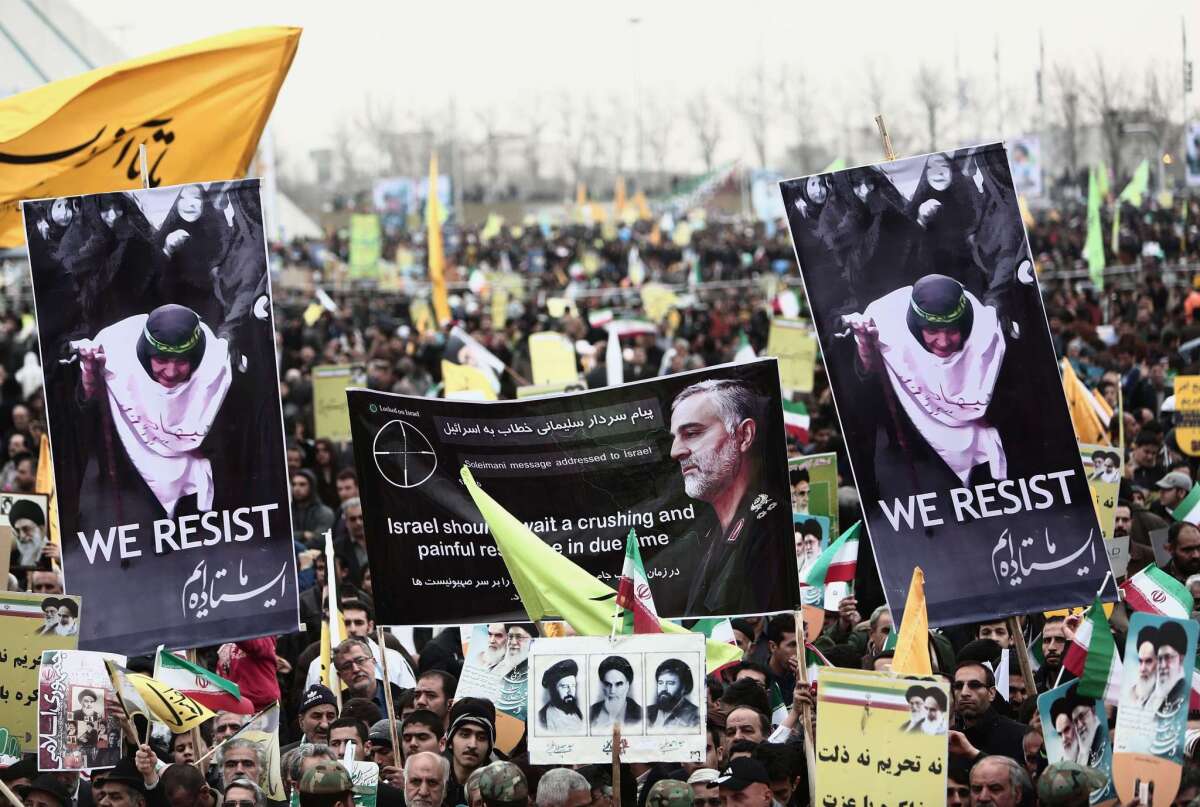Iran’s ‘Supermani’: fabled general, Internet sensation

- Share via
Reporting from Amman, Jordan — In one image he calmly rubs elbows with Iran’s top leaders. In another, he bestows an avuncular gaze on a gaggle of militia fighters.
No matter where he appears, Gen. Qassem Suleimani, commander of Iran’s elite Quds force, remains the stuff of U.S. policymakers’ nightmares: a murky yet seemingly ubiquitous figure with a penchant for turning up in Middle Eastern trouble spots and proxy wars—often at several battlegrounds simultaneously, it would seem, judging by his outsized and at times fictitious presence on the Web and in breathless international press reports.
“Supermani” is the handle one wag has bestowed upon Tehran’s inscrutable point man.
His mission? Thwarting the goals of Washington and its allies at every turn, while adding to the revolutionary glory of the Islamic Republic of Iran.
The actual effectiveness of Tehran’s fabled emissary may be open to question. But in cyberspace, Suleimani—with a graying beard, steady mien and passing resemblance to “The Most Interesting Man in the World” of Dos Equis fame--has emerged as a kind of Iranian master manipulator, schemer and super-spy. His presence on any battlefield, according the ever-expanding if often apocryphal legend, is tantamount to victory for fighters fortunate to bask in his presence.
Suleimani (known as “Hajj Qassem” in the Middle East) most recently materialized as he lent a hand to the Iraqi government’s current offensive to retake the Iraqi city of Tikrit from Islamic State militants. Apparently a revered figure to Iranian-trained Shiite militias in Iraq, Suleimani dropped by the neighborhood to offer “consultations” to Iraqi commanders on the ground, reported Iran’s semi-official Fars news agency.
This time around, ironically, Suleimani is effectively fighting on the same side as his arch-enemy, the United States—which, like Iran, also backs Baghdad in its fight to destroy Islamic State. Quite understandably, however, neither Tehran nor Washington is keen to acknowledge this awkward alliance of decades-long adversaries.
A scant two weeks ago, images showed Suleimani marshaling pro-government forces in southern Syria to push back opposition rebels supported by Washington and its allies.
With a zeal once reserved for “Where’s Waldo?” puzzles, Middle East observers obsessively track Suleimani’s movements across Syria and Iraq and other conflict zones. Enthusiasts pounce on any fresh sighting of the silver fox of the Iranian Revolutionary Guard Corps as he inspects front-line troops, confers with high-ranking officials, or even consoles a child.
“Suleimani has become a symbol of Iran’s secretive, enigmatic and behind-the-scenes legendary intelligence and sabotage capabilities,” Karl Sharro, a Lebanese satirist, wrote in a recent blog post. He noted the elusive commander’s peculiar ability to be in two places at once, while still casting no shadow -- ironic, “considering that the most common word used to describe him is ‘shadowy.’”
Based on photographs circulating on social media, however, it would seem that “Supermani” has another trick up his sleeve -- time travel.
In cyberspace, Suleimani’s bearded visage can clearly be seen in U.S. President John F. Kennedy’s limo on that fateful afternoon in Dallas in 1963. Isn’t that Suleimani in the august company of Albert Einstein and other scientific luminaries talking quantum mechanics at the celebrated 1927 Solvay conference in Brussels? And there goes the shadow-man shaking hands with astronaut Neil Armstrong on the surface of the moon in 1969 -- without a space suit, no less.
“The reflection [of Suleimani’s face on Armstrong’s visor] proves it’s true,” confirmed Arash Karami, a Twitter user with his tongue firmly in cheek.
Special correspondent Bulos reported from Amman and staff writer McDonnell from Beirut.
Follow @mdcneville for news from the Middle East
More to Read
Sign up for Essential California
The most important California stories and recommendations in your inbox every morning.
You may occasionally receive promotional content from the Los Angeles Times.











